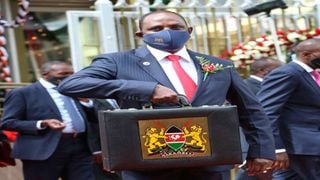
Treasury Cabinet Secretary Ukur Yatani displays the budget briefcase at The Treasury before leaving for Parliament Buildings for the reading of 2021/2022 annual budget on June 10, 2021.
| Sila Kiplagat | Nation Media GroupNews
Premium
MPs shoot down Yatani’s taxes on unga, boda bodas
What you need to know:
- Proposed amendments intend to cushion the poor facing hard times amid the Covid-19 pandemic.
- Move is likely to set the Legislature and the Executive on a collision course.
Members of Parliament have shot down a raft of new taxes proposed by Treasury Cabinet Secretary Ukur Yatani, setting the Legislature on a collision course with the Executive, which is hard pressed to finance the Sh3.6 trillion national budget.
The MPs, in draft amendments to the Finance Bill 2021, have rejected the new taxes on bread, flour and motorcycles, terming them as essential products whose price increase is set to hit the low income earners hardest.
The National Assembly’s Finance and National Planning committee, chaired by Homa Bay Woman Representative Gladys Wanga, says the proposed amendments are intended to cushion the poor who are already facing hard times in the wake of the Covid-19 pandemic.
While moving the Bill yesterday, Ms Wanga pointed out that ordinary bread is a staple food for many Kenyans hence introducing VAT on it will pile more pressure on many households.
“The basics at this time should be zero-rated. We should not make life harder for Kenyans but we should also be alive to the fact we should raise money to finance the budget amid the tough economic times,” Ms Wanga said.
The new taxes are intended to boost Kenya Revenue Authority’s revenue collection to hit a target of Sh1.78 trillion in the financial year beginning July 1, up from Sh1.57 trillion in the current financial year that ends on June 30.
The Treasury’s attempts in recent years to grow the tax base through such measures as introducing the turnover tax that targeted small businesses and rental income tax for landlords have not yielded much gains for the taxman.
Mr Yatani is also faced with a Sh929 billion budget deficit that he plans to plug by borrowing domestically and in the international markets.
Proposed taxes
The committee wants CS Yatani’s proposal to amend the VAT Act to subject bread to 16 per cent Value Added Tax deleted.
“Sub-clause 22(b) be deleted because subjecting ordinary bread to 16 per cent VAT will make the product expensive and inaccessible to many Kenyans. This also runs counter to the government’s Big Four Agenda pillar on food security,” reads the report.
“The committee agreed to the deletion of the proposed sub-clause 22(b) so as to maintain the price of ordinary bread since it’s an essential commodity and imposition of VAT at 16 per cent would lead to a corresponding price increase,” further reads the committee’s report.
All the proposals will need to get approval of the National Assembly failure to which the proposed taxes take effect beginning July 1.
The MPs have differed with Mr Yatani’s proposal to raise tax on motorcycle taxis, commonly referred to as boda bodas, and have instead recommended a retention of status quo, arguing that increasing the rate will affect thousands of youths who depend on them to make a living.
“The boda boda industry has contributed to the employment of youths in this country hence the committee unanimously decided to maintain the current status,” Ms Wanga said.
The government had planned to change the taxation model for motorcycles from a uniform charge of Sh11,608 to a percentage rate of 15 per cent, which makes it costlier to buy motorbikes priced above Sh79,000.
Mr Yatani also suffered another setback as MPs shot down his proposal to increase VAT without Parliament’s approval.
Revenue raising measures
The Treasury CS was seeking unfettered powers to set VAT without the need to seek Parliament’s approval in order to provide room for faster implementation of tax changes.
However, the committee noted that ceding to such proposals affects the principles of separation of powers between the Executive and the Legislature, warning that the move will also give the Executive a free hand in making the regulations.
“The proposal to delete requirement for the National Assembly to approve VAT regulations before gazetting was opposed by most stakeholders because it will take away the powers of the National Assembly to scrutinise Regulations in line with the requirements of the Statutory Instruments,” reads the report.
The Finance Bill, 2021, sets out revenue raising measures for the National government and amends specific tax laws and other statutes for the effective collection of revenue as relates to the budget of Fiscal Year 2021/2022.
New mothers are also among the biggest winners in the committee’s amendments to the Finance Bill 2021, after it proposed the exemption of all products relating to infants from VAT. The products, which Treasury had initially proposed to impose 16 per cent VAT, include infant milk and others not containing added sugar or sweetening matters prepared for infants.
However, MPs have increased the tax bracket of betting to include other forms of betting, a move that will see the tax proposal move from the 20 per cent as proposed by Mr Yatani to 30 percent.
The committee argued that the proposed amendment by the CS to re-introduce excise duty on betting at a rate of 20 per cent on the amount wagered or staked should be deleted as it will deal a huge blow to the players in the industry and may lead to additional companies exiting the market.
Kenyans who provide digital services in the country will also be relieved after the committee clarified that they will not be subject to the newly introduced Digital Service Tax (DST), indicating that it will only apply to non-Kenyan service providers.






